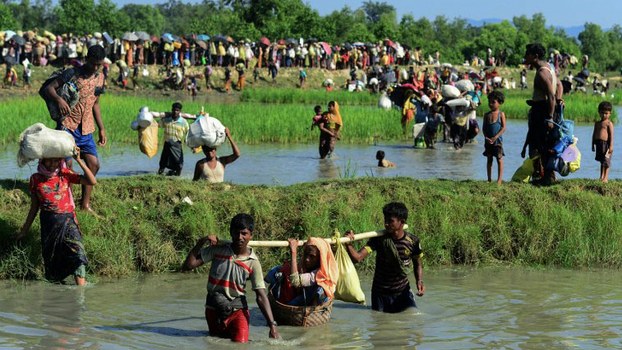




As many as 15,000 new Rohingya refugees entered Bangladesh since Sunday, U.N. officials said Tuesday, as new satellite imagery showed “tens of thousands of structures, primarily homes inhabited by ethnic Rohingya Muslims” had been burned in Myanmar’s Rakhine state.
But authorities in southeastern Bangladesh, which has borne the brunt of the world’s fastest-growing refugee crisis, said many more new arrivals – about 40,000 refugees – had crossed over from Myanmar within the past 72 hours.
An analysis of newly released satellite images revealed 288 Rohingya villages were targeted in arson attacks in Rakhine since Aug. 25, and 66 of those villages were burned after Myanmar officials claimed the military’s “clearance operations” in Rakhine state had ceased in early September, Human Rights Watch reported Tuesday.
Some newcomers said they had escaped Rakhine amid a critical food shortage, which, they alleged, was forced upon their minority-Muslim community by the military.
“We had been almost starving, along with our kids, for a long time,” refugee Md Islam, 45, a resident of a village in Buthidaung township told BenarNews, an RFA-affiliated online news service.
“[W]e were almost confined in our houses for days after days. Panic gripped our life. How long could we survive in such a situation?”
His family ran out of food and all the local markets had been shut since the Myanmar army and Rakhine Buddhist militia targeted his village in attacks, he said.
“Inhuman torture is going on in Rakhine,” fellow refugee Abdur Rashid told BenarNews, adding that the “Myanmar army has been creating an artificial food crisis” to “force Rohingya to flee.”
Another Rohingya from Buthidaung, Md Alam, told BenarNews he and others had trekked through hills, fields and marshes for the past 10 days “to come to Bangladesh for survival.”
‘Stranded’
On Tuesday, international aid agencies sharply revised upward their overall estimate for the number of Rohingya refugees who have fled to southeastern Bangladesh amid a cycle of violence in Rakhine that broke out on Aug. 25.
About 582,000 Rohingya refugees have crossed into Bangladesh since late August, the U.N. and international humanitarian agencies reported.
“Around 40,000 Rohingyas have entered Bangladesh through [border points] of Ukhia in three days,” Md Ali Hossain, the deputy commissioner of Cox’s Bazar district, which encompasses the sub-district of Ukhia, told BenarNews.
Speaking in Geneva, U.N. refugee agency (UNHCR) spokesman Andrej Mahecic said the latest arrivals, numbering 10,000 to 15,000 people were stranded near Anjuman Para village in Ukhia. Many told relief workers they had walked for a week to reach Bangladesh after their villages were set on fire.
“As of this morning they are still squatting in the paddy fields of Anjuman Para village in Bangladesh,” he said. “They are waiting for permission to move away from the border, where the sound of gunfire continues to be heard every night from the Myanmar side.”
Malaysia calls for ‘safe zone’
Also on Tuesday, Malaysia’s deputy prime minister told Malaysian media the government would propose that the U.N. Security Council adopt a resolution to create a U.N.-monitored “safe zone” so hundreds of thousands of Rohingya refugees could return to Myanmar unharmed.
As he wrapped up a two-day visit to Bangladesh during which he toured a refugee camp in the southeast, Deputy Prime Minister Zahid Ahmad Hamidi announced some Malaysian government proposals aimed at alleviating the refugee crisis stemming from violence across the border in Rakhine state.
These include proposing “to the United Nations for the region to be made a security zone …,” Malaysia’s state news agency Bernama quoted Zahid as saying.
“Maybe U.N. Security Council members can raise this matter for it to be made a resolution so that finally when the Rohingya return, there is a U.N. monitoring team there in place,” he said.
Zahid’s statement followed similar comments made by Bangladesh Prime Minister Sheikh Hasina during a speech before the United Nations General Assembly in September, when she called for creating U.N.-supervised safe zones inside Myanmar to protect Rohingya Muslims from further violence.
Malaysia, which has been cleared by Bangladesh to build a 100-bed field hospital in Cox’s Bazar to treat sick or injured Rohingya refugees, also will assign a special attaché to its embassy in Dhaka to help coordinate humanitarian assistance to the refugees, Zahid said.
“Malaysia believes that the Rohingya humanitarian crisis needs to be settled through regional cooperation, especially among ASEAN countries,” he added, according to Malaysia’s Star newspaper.
“Although Myanmar is an ASEAN member, we want to make it clear that the Rohingya issue transcends geographical borders,” he said, adding, “We have no wish to interfere in the internal affairs of other countries, but it should be understood that the Rohingya issue is a regional problem.”
‘Efforts must be scaled up’
Bangladesh and humanitarian agencies have been struggling to accommodate and provide basic services for the hundreds of thousands of Rohingya who fled northern Rakhine during a military crackdown following deadly attacks on 30 police posts and an army facility on Aug. 25.
The Arakan Rohingya Salvation Army (ARSA), a militant group, claimed responsibility for the attacks as well as for deadly smaller-scale raids on three border guard stations in October 2016.
Myanmar authorities have rejected widespread international criticism that their security forces targeted Rohingya civilians in atrocities such as killings, rapes and the burning of villages. They have blamed ARSA insurgents for the violence.
On Monday, the European Union announced it was reviewing military cooperation with Myanmar, as the bloc called on Myanmar to bring to justice the perpetrators of crimes against the Rohingya.
Meanwhile, three top U.N. officials, including the heads of UNHCR and the International Organization for Migration, issued a joint statement urging the international community to raise U.S. $434 million quickly to deal with “the major humanitarian emergency” unfolding in southeast Bangladesh.
“The efforts must be scaled up and expanded to receive and protect refugees and ensure they are provided with basic shelter and acceptable living conditions,” the officials said Monday.
Reported by BenarNews, an RFA-affiliated online news service.